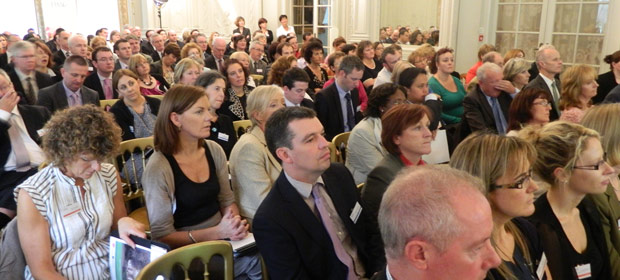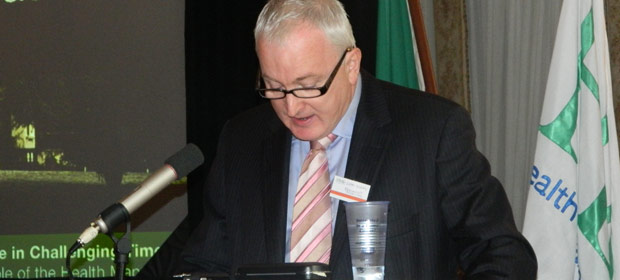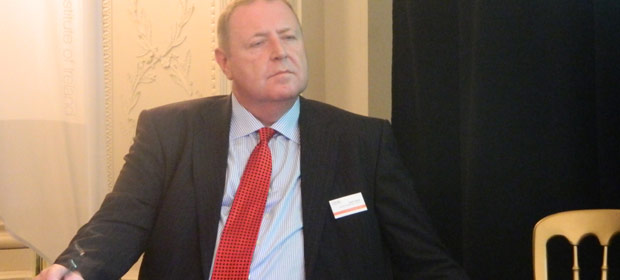The first Annual HMI Conference, which packed the enormous ballroom in Farmleigh (with a waiting list for cancellations) threw up new and exciting ideas on how a reformed health service might be delivered, managed and governed, writes Maureen Browne.
The need for strategic investment in the ongoing and formalised professional development of health service managers turned out to be a major theme of the HMI’s first Annual National Conference, held in beautiful Farmleigh in Dublin’s Phoenix Park.

The second and equally powerful theme to emerge was the belief that the Irish health services require, to quote Health Minister, Dr. James Reilly, to be “turned upside down,” as it is no longer fit for purpose.
The Conference, which packed the enormous ballroom in Farmleigh (with a waiting list for cancellations) also threw up new and exciting ideas on how a reformed health service might be delivered, managed and governed.

HMI President, Richard Dooley urged the need for formalised professional development for health managers when he opened the Conference and this was echoed by Health Minister, Dr. James Reilly who said that every part of the Irish health service must be managed at a professional level by people with knowledge, understanding and the necessary skills.
HSE CEO, Cathal Magee weighed in saying that one of the issues facing the Irish health service was to separate the management and administration career streams.
He said administration was a required core competence for the effective running of the health service, we needed superb back office administration and we needed to develop our administrative capability. We also needed to strengthen the management system and grow our future management. Significant investment in management as a strategic priority was required and we needed interim solutions as we didn’t have the luxury of growing future senior managers over the next three to four years.
Magee said that the challenge of the moratorium was an issue 12 months ago. The current challenge was that we couldn’t fund the people in the system
In a contribution from the floor, Dr. Ambrose McLoughlin, Registrar and Chief Executive of the Pharmaceutical Society of Ireland said he believed health service managers in Ireland should seek a formal regulatory framework. He thought this was critical for the Institute and the future of health service managers. “I think we should put the Minister under pressure to put a regulatory framework for managers in place so that senior managers are accountable, and have the autonomy which will protect them professionally.”

The Minister for Health said it was dangerously easy to follow process. He wanted to turn process upside down to see that the patient came first, second and last.
Magee said we had to “unbundle and invert” the organisation. “We can’t think about a hierarchical organistion, our front line delivery units are a critical component. We can combine them into networks,” he told the Conference.
The whole question of pay was brought up by Ned Byrne, Chief Executive of St. Vincent’s Hospital, Fairview, Dublin when he raised managers’ willingness or otherwise to accept pay cuts, which he thought were on the cards and the elephant in the room.
Magee said that while pay policy was an issue for government, there might be opportunities to postpone looking at basic pay for savings. Overuse of absenteeism did not work for patients or colleagues and we could look at premium payments and rostering, rather than basic pay. The question might be did we want to do more hours for the pay we had rather than cutting pay.

TCD’s Prof. Charles Normand said we should consider flexibility and maybe treating newer recruits differently. It might also be necessary to buy out consultants entitlements with once off payments.
Liam Duffy, CEO of Beaumont Hospital, Dublin and one of the Conference Chairs raised the question of how the moratorium was working.
A key challenge now was how care was co-ordinated across primary and secondary areas
Magee said that the challenge of the moratorium was an issue 12 months ago. The current challenge was that we couldn’t fund the people in the system. He thought it was not viable to manage the system from the middle. He would fully subscribe to the view that local management should be given the financial envelope. Management was about being able to make decisions and choices. The controls at the centre did not work – this year they top sliced to fund clinical programmes and he thought top slicing was beyond its ‘sell by’ date. Hospitals should be able to do this locally. A key challenge now was how care was co-ordinated across primary and secondary areas.
He said financial systems at individual hospital level were not fit for purpose. They could not provide information on a real time basis but he still thought management locally could have a better feel for how things were going. “In commercial organisations you need to know what is happening before you get financial reports at the end of the month.”
Normand said that some research he had carried out found key management information was in nurses’ notebooks which were filled in each day, while other accounts disguised rather than revealed what was going on.
Willie Heuschen, Secretary General of the European Association of Health Managers said the principle of insurance in had been nearly submerged with claims for services, while Sue Hodgetts, CEO of the Health Management Institute in the UK warned that the UK process of change involved transition into a new, enlarged and “fairly scary” bureaucracy.
Martin Cowley, a member of the Board of the Mater Hospital, Dublin queried if universal health insurance would achieve a better system in the long run.
“In commercial organisations you need to know what is happening before you get financial reports at the end of the month.”
Normand said he thought it was an opportunity to get things right but it did not in itself get things right. Any system could work and any system could unfortunately, fail. We needed to look very carefully at entitlements – if we had medical cards for everybody tomorrow, primary care would collapse.
Magee’s view was that it addressed issues of incoherence and eligibility. It had its own complexities and complications and he though the journey would be a challenging one. It would not create more money and we would still have to deal with the fundamental funding issues.
Willie Heuschen, Secretary General of the European Association of Health Managers said that for a long time it was thought the perfect system was in the Netherlands but now with increasing waiting lists, patients were going over the border to Belgium for treatment. There was no perfect health system in Europe.
Dr. Martin Connor gave a briefing on the new Department of Health Special Delivery Unit which he heads. The thrust of his plan is to provide managers with real time information on number of long waiters, the procedures for which they are waiting and consultants to whom they have been referred. This, he said, would then allow managers to explore alternative ways of having them treated. It all sounded very exciting and there will be a general welcome for the provision of up to date statistical information, but it was not clear to me where the capacity to treat these patients will be found once they are identified.

David Fillingham, current Chief Executive of Advancing Quality Alliance (AQuA) in the UK and CEO of the Royal Bolton Hospital when it dramatically improved its services while cutting costs, said that to bring about rigorous improvement, robust and convincing data, hands on experience, a changed management system and leadership styles were all required.
In reply to a question from Ann Marie O’Grady, Head of Clinical Services and Business Planning at Beaumont Hospital about how he encouraged cross functional working he said we had been organising hospitals in the wrong way. They were in silos while patients walked horizontally through the system. Hospitals had to be connected to GPs and social services. Take respiratory care – in the Royal Bolton Hospital; they had brought together all disciplines in the hospitals that dealt with this area. It was the first time all disciplines had been in the room together. They then began to forge real relationships, rather than saying ‘let’s cut radiology’ which means patients did not get scans and had to spend longer in hospital.
Normand said that some research he had carried out found key management information was in nurses’ notebooks which were filled in each day, while other accounts disguised rather than revealed what was going on
HMI Vice President, Derek Greene, Chief Executive of the National Rehabilitation Hospital in Dun Laoghaire and one of the Conference Chairs asked about the correlation between staff morale and turnover and how it started to improve as change were made.
Fillingham said that while it would take five to seven years to get changes implemented, there were things that could be done much more quickly. The risk was in overclaiming these. But you could choose carefully, get quality and cost savings and publicise and celebrate these achievements.
Still on the theme of change, Breda Crehan-Roche, CEO Ability West, told the Conference about new funding arrangements for the provision of services and supports for persons with disability which are expected to be introduced next year in Ireland. She said there was likely to be a reduction in block funding. Multiple funding sources would be considered and reviewed and there was no doubt that commissioning in some form or shape was on the cards and would be implemented in the next 12 – 18 months. Commissioning could take the form of direct payments, personal budgets or individualised ringfenced funding.
Governance was an issue which emerged in one way or another in many presentations. A blame-free reporting and management culture was in the best interests of patients and those delivering services, Aidan Horan, Director, Consultancy, Training & Development Directorate IPA told the Conference.
He said good governance was a pre-requisite for legitimacy, credibility, reputation and authority.
Closing the Conference HMI President, Richard Dooley said that managers needed to start forging an agenda for themselves, as to how they could progress the professionalism of health service management. “Each of us is here because of the personal values which we hold dear and these are values with which we live on a daily basis. In our work, we walk the walk. We must push forward to professionalise our services. We do excellent work, we owe it to patients and to ourselves as managers to put this on a professional footing. This conference is the beginning of a new and broader engagement between the HMI, the HSE and others.
GSK and Cornmarket provided sponsorship for the Conference.

